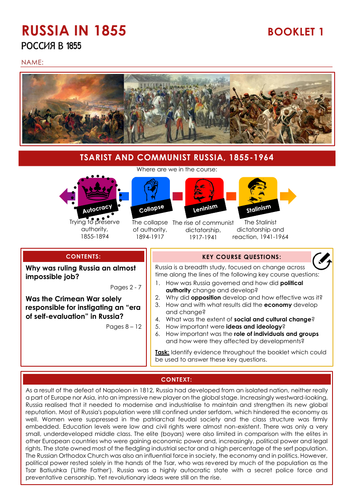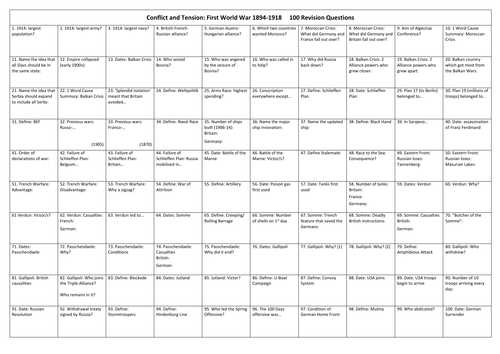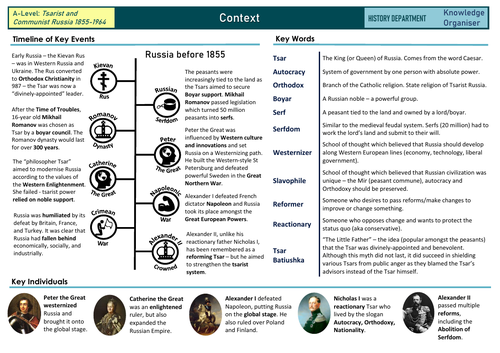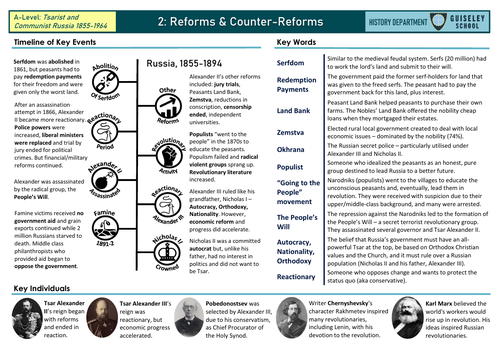26Uploads
6k+Views
2k+Downloads

Knowledge Organiser Russia before 1855 (context)
A knowledge organiser aimed at A-Level History students studying AQA’s Tsarist and Communist Russia 1855-1964 course. This is the first knowledge organiser for the course which focuses on key contextual information (pre-1855) and includes sections on key individuals, key terms and a timeline.

Knowledge Organiser - Russia Alexander II & Alexander III Reforms & Counter-Reforms
A knowledge organiser aimed at A-Level History students studying AQA’s Tsarist and Communist Russia 1855-1964 course. This is the second knowledge organiser for the course which focuses on the reigns of Alexander II and Alexander III and their reforms and counter-reforms (1855-1894) and includes sections on key individuals, key terms and a timeline

Lessons on Revolutions & Russia case study
A complete scheme of learning designed for Year 9 which focuses on the concept of Revolution. The second part of the scheme looks at Russia/Soviet Union as a case study.
Purpose:
Introduce students to key substantive concepts of revolution, communism, dictatorship.
Continue developing understanding of historical disciplinary concepts: causation, chronology, interpretations, historical reading and writing.
Develop sense of period and conceptual understanding in preparation for future work on the modern world, e.g. Nazi Germany and Russia/Soviet Union, and especially about different political systems and societies.
Core enquiry questions:
Why have revolutions occurred across time and place?
How did Stalin keep the Russian Revolution going?
Why was communism such a threatening ideology for many in the modern world?
Substantive Knowledge:
Revolution, communism, dictatorship/different political systems
Disciplinary knowledge:
Chronology - Sense of period (modern world), historical writing, historical reading and interpretations, particularly how we assess how convincing an interpretation is (introducing an A-level skill/language).

Conflict and Tension: The First World War [1/3 Causes]
PowerPoints and all lesson materials for teaching the first third of the AQA GCSE Conflict and Tension: The First World War course. These lessons focus on the causes of the war, and includes assessment practice, knowledge recall quizzes and source practice.
Key topics covered:
Introduction to the Great Powers
Imperialism
Militarism
Moroccan Crises
Balkan Crises
Assassination
Schlieffen Plan
(Parts 2 and 3 sold separately. Also see the revision materials, such as the WW1 knowledge organiser and 100 questions revision sheet.)

Lessons on Civil Rights
A short scheme of work on segregation and the American Civil Rights Movement, designed for Year 9 (after a scheme of work on Nazi Germany). All PowerPoint resources included.
Topics covered:
Segregation
Race relations
Key events of the Civil Rights Movement
To what extent is America the ‘land of the free’?

History Homework Menu and Feedback Sheet
Homework menu (with differentiated options for students to choose between), homework tracker and peer feedback grid, and a list of some ideas for KS3 History homework. (All based on ideas I have picked up from different schools, teachers and resources I have seen).
The homework menu is intended to be used for one project and has slots for challenging, hard, medium and simple tasks (named Food Mountain - challenging, Hearty Helping - hard, Light Bite - medium, and Snack - simple). The instructions for how many of each level should be attempted throughout the project are explained on the homework tracker. There is also a grid which students can use to jot down deadlines for each part of the project (there are three part to each project - the starter, main and dessert). The peer feedback grid allows students to praise and evaluate their peer’s work and for the student to respond to this feedback.







![Conflict and Tension: The First World War [1/3 Causes]](https://d1e4pidl3fu268.cloudfront.net/0bf5e76d-b8b7-4659-95b5-d9c8d70a0ad4/Screenshot20240225123512.crop_632x474_0,0.preview.png)

